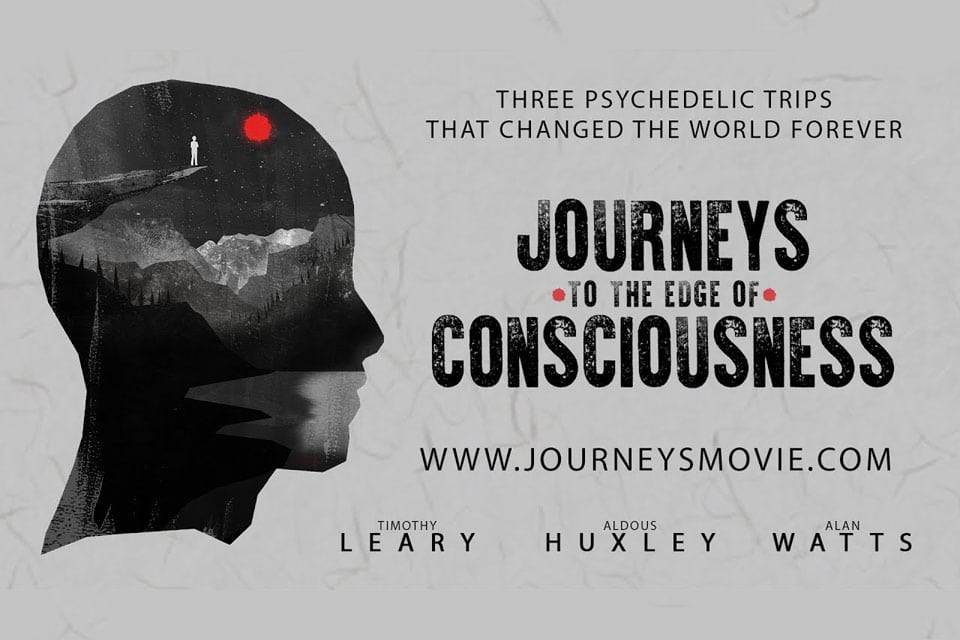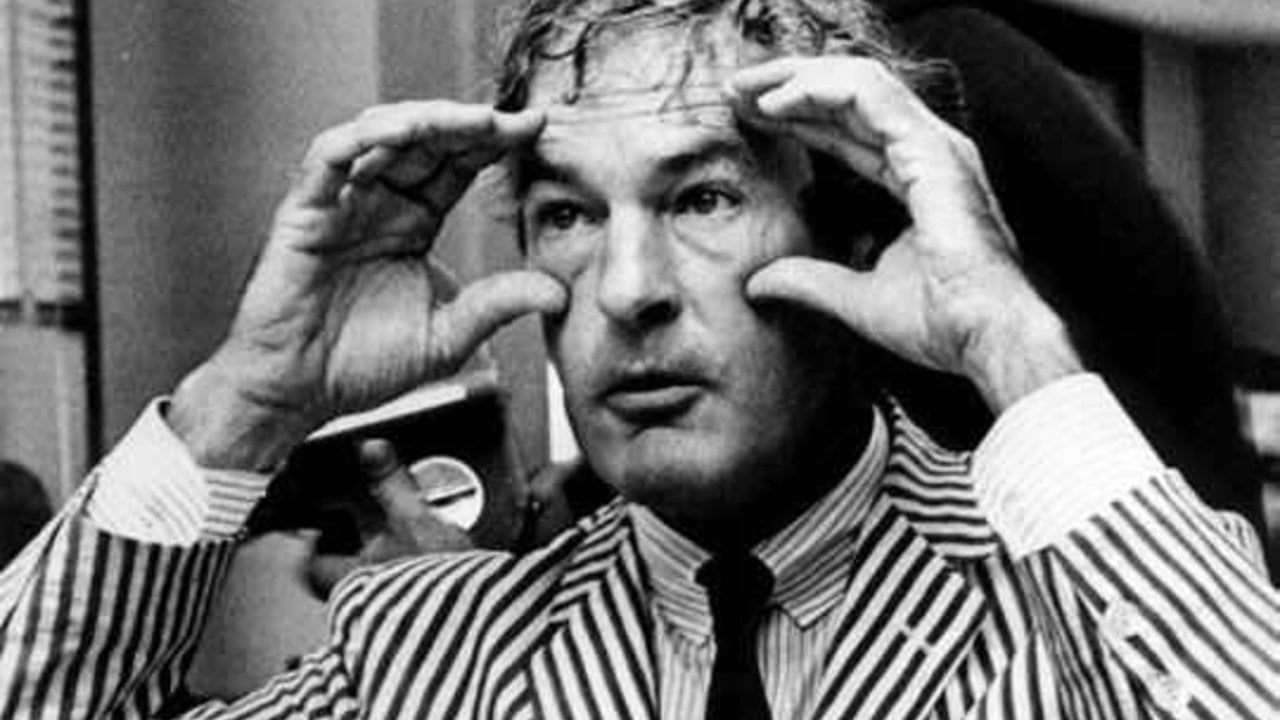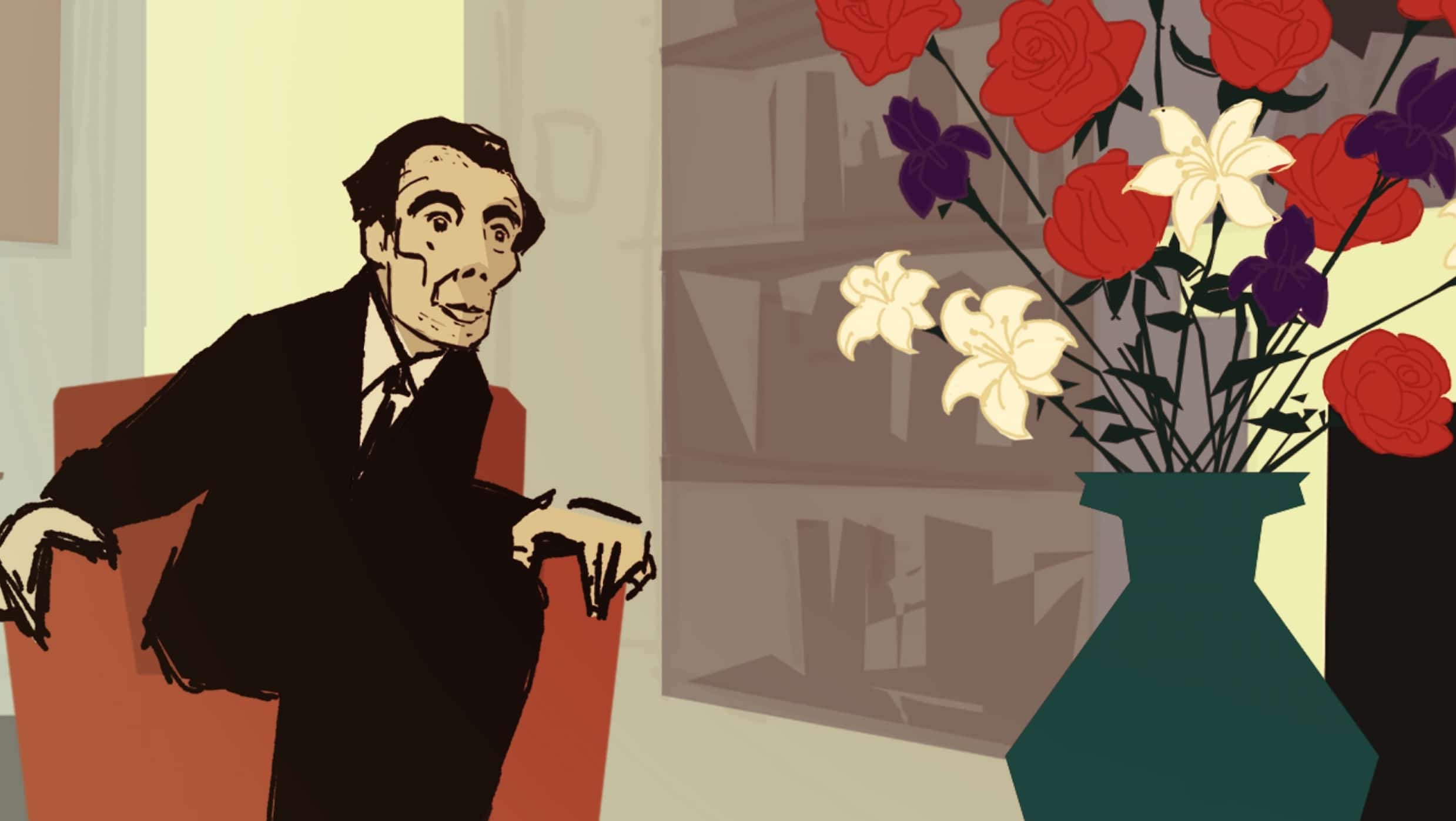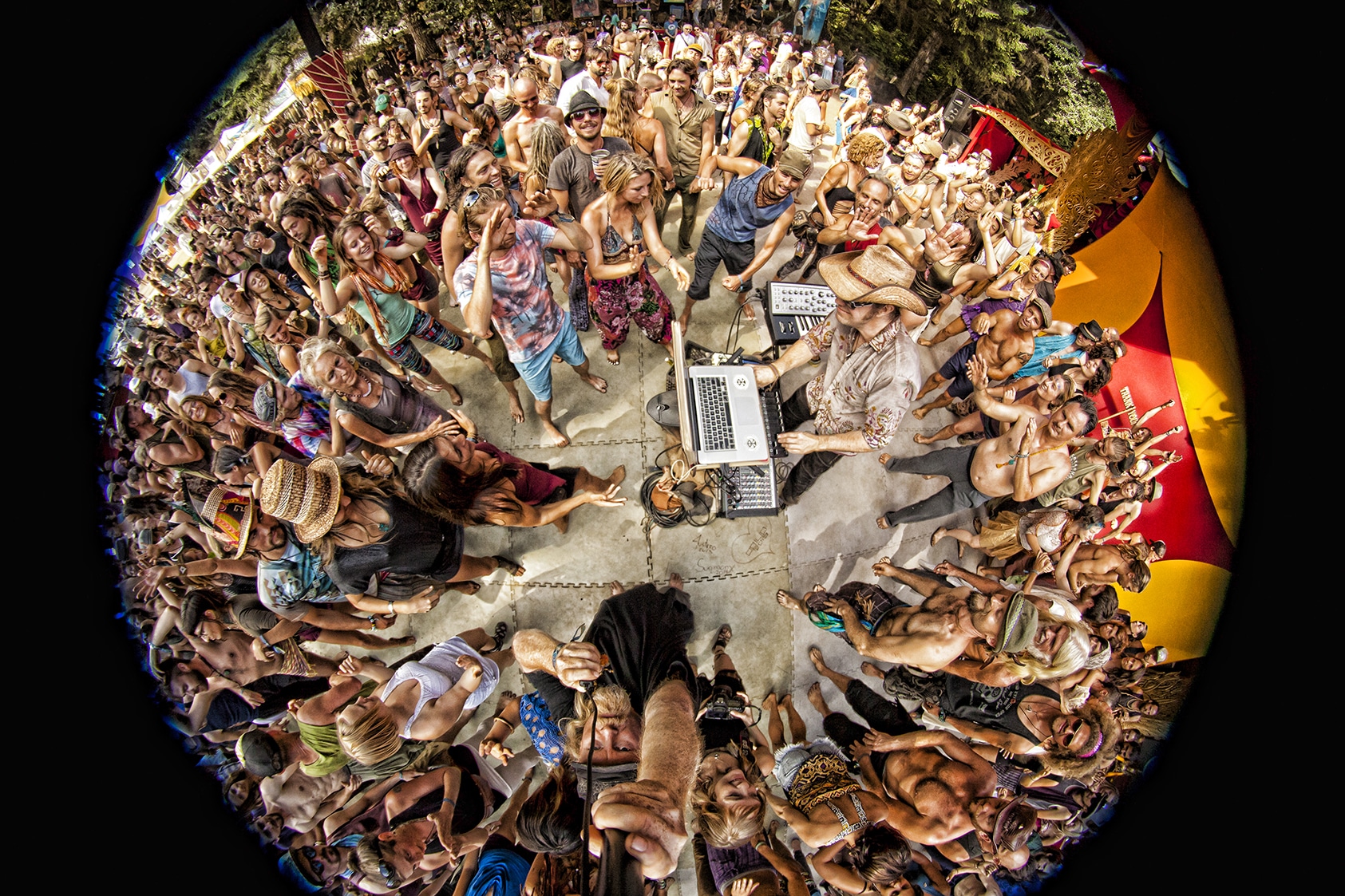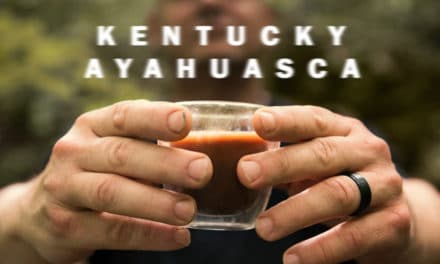Rob Harper is the UK filmmaker behind Journeys to the Edge of Consciousness, a fantastic new film that centers around three pivotal figures in the psychedelic movement: Timothy Leary, Alan Watts, and Aldous Huxley. The film features animated narrations of some of their most pivotal psychedelic trip reports, and intertwines interviews with modern psychedelic luminaries such as Amanda Fielding, Ben Sessa, Dennis McKenna, Gabor Mate, Rick Doblin and Graham Hancock. We spoke with Rob about the inspiration behind making this film, and what we can learn by listening to Leary, Huxley, and Watts describe in their own words how they first encountered these powerful substances.
Thanks so much for speaking with me today, Rob. I really enjoyed the film! What inspired you to make Journeys?
There were two really big starting points for me with this film. One was a book by Stanislav Grof called Realms of the Human Unconscious, which I think has been republished recently with a slightly different title. It’s all about his work in the 1950’s using LSD in psychotherapy in Czechoslovakia. Back in 2014, someone handed me this book, and it just blew my mind. This guy was a traditional Freudian psychiatrist, and had a very intense experience being given LSD and then being put under a strobe machine. When utilizing it with his patients, the material they were coming out with just completely broke down the paradigm he was working from in terms of understanding the human mind and consciousness. They had past-life stuff coming up, reptilian memories, and all sorts of things that just couldn’t be explained by the then dominant paradigms in psychology. So that really got me fascinated in this territory.
Another inspiration for me was Graham Hancock’s TED talk “The War on Consciousness.” I saw it around the same time as I encountered Grof’s book, and I was just blown away by how much information Graham eloquently squeezed into that short TED talk. So those two were my two launching pads.
Today I’m more familiar with the many cultures around the world that have been dealing with these expanded states of consciousness for thousands of years, and who perhaps have a much deeper understanding than Western culture. But at that time, for my starting point, it was, “What does Western culture have to say about these things? Who are our elders in this regard?”
Leary, Watts and Huxley weren’t the very first Westerners to be encountering these expanded states and the substances, so it’s not that they were the first, but they are the closest thing to elders that we have here in the West. They all encountered these substances later in life, generally in their 40’s and onwards, and they were highly educated when they took psychedelics for the first time. So their launchpad was very interesting, with Leary being a Harvard professor, Huxley a famous novelist, and Watts a scholar of Eastern Mysticism.
When I first read the story of the exchange between Leary and his daughter in Leary’s trip report of his first LSD experience [one of the trip reports featured in the film] it was a real moment for me. When I read that, I was really touched. It said so much about relationships and spoke a lot to what’s going on now, and to people’s lack of contact with themselves and with each other. That led me to about 12 other trip reports that really interested me, and somehow 12 became 6, 6 became 4, and then 4 became 3, and we had the 3 stories that were in the fim.
The title of the film, Journeys to the Edge of Consciousness, has something of a 1950’s comic book adventure feel to it. But it also is a bit like The Lion the Witch and the Wardrobe, if you’re familiar with C.S. Lewis. My fascination with these stories was the way that psychedelics seem to be able to just take you off into another world, or a completely different way of seeing this world and one’s inner world. As a filmmaker, that never stopped fascinating me.
With Leary, it’s interesting—he gets a lot of flak from people saying if it weren’t for him, we could have had legal psychedelic therapy much sooner. I think a lot of people forget just how square and academic and credentialed he was before he became the psychedelic prophet. It’s also really interesting to me that of the three people you feature in the film, Leary was the most square, so to speak. The others were writers and kind of opening their minds to the arts and other spiritual traditions before encountering psychedelics. And yet it was Leary who went the most off the deep end, who became the most evangelical.
Absolutely. This debate around Timothy Leary and his place in psychedelic history is a really interesting and controversial one, a difficult one, and everyone’s got a strong opinion on it. It’s good fun I think. For me, Leary’s writing is just fantastic. That story “The Dropout Drug” is one of I think 12 chapters in his book High Priest, and the book is just amazing. It’s basically a compilation of trip reports with different people on different substances, and it’s just so funny. I find he is really a natural when it comes to irony and comic timing—I really enjoyed Leary’s writing.
I know for instance that Stanislav Grof takes a pretty dim view of Leary and what he did. Grof was working at that time with these substances in a very careful, mature way, and he felt Leary came along and let the genie out of the bottle, being very irresponsible and letting it run rampant. What can I say—history unfolded the way it unfolded, and what other pathways could there have been; what else could have come? It’s hard to say.
At the same time, you’re right—Leary was the squarest of them all. He was this Harvard Professor who I get the sense was quite a heavy drinker. His wife had committed suicide, and there was a lot of tragedy around him and his family. He describes his first LSD experience as a kind of shattering ontological confrontation with the Universe, and says he was never the same again. He was offered a lot of real gifts and painful insights into how he was relating to himself, how he was relating to his family, how he was relating to the world. He talked a lot about the “chess game” of careers and jobs and society and getting ahead, and the social maneuvers we all find ourselves going through sometimes.
How far forward he brought these insights into his life isn’t entirely clear. For instance, it doesn’t seem like that moment with his daughter led to a completely new and revived and connected and open way of being with his children. It doesn’t seem that he took all of those lessons forward. He does seem to have plunged headfirst into this quite narcissistic guru-esque caricature of himself. Apparently when he ended up being held hostage in Algeria by Eldridge Cleaver, he said “Look, I blew the minds of more white middle class kids that anyone else; you should be thanking me!” Lots of young people took his advice and dove down the rabbithole, perhaps without as much support and guidance as they needed.
But on the other hand, from what I have come across, he did say you need a guide and you need to do this carefully, and you need to have proper set and setting. So how far it’s the media’s portrayal of him as an irresponsible guru figure, and how much it’s the truth, I’m not entirely sure myself.
I think it’s no coincidence that because he was the most entrenched in “default society,” following what society says is important, playing and succeeding at all those games, and being so spiritually deprived as a result of it, that interacting with this catalyst led him to this conclusion that this whole path that we’re on in the West, these games we play as a society, are pointless. It was because he was a poster boy for success in our culture that he was inclined to blow that facade apart, because when he finally found meaning, he looked back and saw that our society was devoid of it.
Yes. There’s this line he says the next morning after the trip when they are out on the porch. He asks, “How can we go back to life routines that are obviously pointless, empty and completely artificial? How can I get back on that tram line and play the Harvard professor anymore?”
It was a really interesting journey for me to interview these 12 very learned experts in the film, as they all had different takes on it and different things to add. The meditation teacher Yanai Postelnik told me that maybe we’re not going to find ways to be completely authentic with ourselves all the time, or to completely merge human souls, but maybe we can just take a little step, just try to be a bit more real and authentic and vulnerable with each other. Maybe that is the way—incremental steps. And I think that vulnerability is so key. With all this current focus on status and facades and personas, look at where we are now with Trump and the 21st century. We live in a very narcissistic culture where the appearance of power and status and success is all that matters. Vulnerability is seen as a kind of weakness to be avoided. It’s one of the tragedies of our time, I think.
Absolutely. That’s one of the most important lessons that psychedelics have to teach us: you have to be vulnerable and surrender to the experience. Feeling our feelings, being imperfect and emotional creatures, is part of the human experience—and it’s to our own detriment that we hide that away to protect some sort of social facade.
Yes, and also there’s the wound. When you talk about narcissism, there’s always the wound that it’s covering over. And like you said, these substances seem to be very effective at revealing that core wound, bringing people to a point where they encounter whatever they are avoiding. Often that’s a long, hard uncomfortable look in the mirror – but it’s exactly these painful insights that can also offer us the possibility of transformation and change.
As the psychedelic renaissance matures, there are a lot more voices talking about diversity and the need for more inclusivity—of different cultures, women, minorities, trans people, queer people, and so forth. I’ve heard many times by now, “There are too many old white men in charge of the psychedelic movement, and they need to step aside so that underrepresented people of different backgrounds can have a voice too.” I’m curious how you feel about this push for more diversity, while at the same time acknowledging the importance of looking back at Leary, Watts and Huxley. What is your take on that? Why are these figures important, but also, how does diversity enter this equation?
I think it’s a conversation that’s going on everywhere right now, the psychedelic renaissance included. As you say, if one goes back to the 1950’s and 60’s looking for well known and published accounts of psychedelic experiences, you find yourself looking at a very specific demographic of people to draw from.
I think for me, at root these are human stories, and they are not just male stories and they are not just caucasian stories. I like to think and hope that there is some kernel of human truth in there that everyone can connect with and identify with. I can’t speak to each audience member, so that’s for everyone to say and find for themselves, really.
I remember at the very first screening of this film, we had a pre-screening at Breaking Convention, which is the bi-yearly psychedelic conference we have here in the UK. There was a Q&A afterwards, and a young white man in the audience said he loved the film but felt that there wasn’t as much diversity in it as perhaps he’d like. I thanked him and said it’s a legitimate thing to talk about and to question. I was working with the material that was available, and hoping that there was something human in there for everybody.
It did leave me thinking. Afterwards, a half-Japanese and half-African pregnant woman came up to me and said, “I loved your film” and made specific reference to the young man’s comment. She said, “I’m half-Japanese and half-African and your film brought up so many questions and thoughts for me personally.” She’d never had a psychedelic experience and was preparing to have her first I think later this year. And she said watching the film was a very emotional experience for her, and that it had unearthed all sorts of questions about the world that her child would be brought up in. So that was encouraging for me.
I hope that there’s some kernel of human truth that everyone can connect with in the film. But I’m also very much aware that it is a small snippet of a very small part of this global history of humans and psychedelics. The much bigger topic of the shamanic roots of human experience and human contact with psychedelics is a subject I want to explore further.
Are there any new projects in the works, or seeds that are starting to grow? If you could snap your fingers and make any other film to explore another topic, what would it be?
Great question. At the moment I’m still very much still stewarding this film out into the world. Launching it in September really felt like giving birth to a child. It’s been five long years making this film. It’s an indie project and has involved a lot of hard work and sacrifice for me and a lot of other people. I remember before I launched it, it really felt like a kid was growing up and going off to college. I sort of said to the film, “You’re going to go places I’m never going to go; you’re going to meet people I’m never going to meet” and that was such a pleasure. So yeah, I’m still stewarding it through the world and still getting contacted on a daily basis by people all over the world who want to screen it. It’s currently being translated into six or seven languages. I’m pleased with how the film is reverberating out and how word is spreading.
One subject I’m really interested in exploring… I’ve done the 1960’s and the West’s take on this. I’d be very interested in going a step further and looking at the shamanic roots and origins of humankind’s relationship to these expanded states of consciousness. I think their voice needs to be heard right now more than ever, the wise women and men who are quietly out there doing a lot of very important work.
On a final note, we’re really relying on grassroots people to help us spread the word about this film, and I would ask anyone who’s interested in these issues to get in touch and co-create a local screening in your community. Screening the film is a great way to have public discussions about this very important subject.
We are very grateful to Rob for speaking with us about the inspiration behind his film, Journeys to the Edge of Consciousness. If you’d like to watch the film online, visit the film’s website, and if you’d like to organize a screening in your area, click here.

